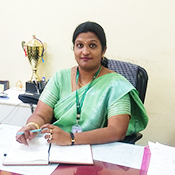
The Department of Electronics and Communication Engineering was established in the year 2001 with a current intake of 60. The department is equipped with sophisticated laboratories and a separate departmental library facility with more than 1000 engineering text books.
The fast changing technological scenario poses to the institute in challenge of continuously updating its curriculum and faculty to be able to impart state-of-art education to the students. Changes, both major and subtle, have been made by the department of Electronics and Communication Engineering to be better prepared for tomorrow. The department has consistently intended to produce graduates of exceptional quality and caliber.
The department has IETE student chapter. Under this banner department conducts various curricular and co-curricular activities such as Workshops, seminars, Industrial visits etc. The students have carried out important projects in BEL, ISRO, HAL and implemented projects on QPSK modulation technique in VLSI using Xilinx FPGA, Image processing application for different domains, Sensors used in automation in autonomous mobile Robots, Bluetooth DAQ using ARM, Advance Traffic Control, and Fire Fighter Robot etc. Also, our Alumni are placed in the top notch MNC’S like Infosys, BEL, HP, TCS etc.
Vision
Empower every student to be creative and productive in the field of Electronics and Communication Engineering by imparting quality education and inculcating human values
Mission
To establish as a Center of Excellence in Offering quality education in Electronics and allied subjects.
To promote collaboration with industry for Constructive interaction, for better integration of theory and application.

Welcome to the department of Electronics and Communication Engineering at Sri Krishna Institute of Technology Bengaluru. The department is located in a sprawling location with state of art facilities and highly qualified faculty members. The department works with the objective of addressing critical challenges faced by the Industry and academia. We lay a lot of emphasis on our unceasing commitment towards our students, helping them to learn, grow, develop, and achieve their goals in their pursuit to excel in their professional career.
The Department of Electronics and Communication Engineering, established in 2001, is one of the most dynamic departments of SREIS Group of Institutions. The department has consistently maintained an exemplary academic and research record. The greatest asset of the department is its highly motivated and learned faculty that prepares the students to confidently face the global multicultural environment. The Department not only aims to make our students technically sound and knowledgeable but also to nurture their wisdom and make them a better and responsible human being.
The faculty at SKIT, the best engineering college in Bengaluru, works with highly charged team spirit in different technical areas like VLSI, Image & Signal Processing, Embedded System, and Wireless Sensor Network which leads to key research publications in these areas. The department ensures to provide a healthy environment to the students to develop analytical and practical skills and apply them to real world problems. To motivate the students the department organizes regular training sessions through state of art software & hardware tools. Apart from these our faculty and students are encouraged for real time application based ideas and projects. To bridge the gap between institute and industry for the high dynamic changes taking place in technology the department has signed MOU with professional bodies like IETE and various industries. The faculty and students have also participated in various technical competitions and achieved commendable ranks.
The students passed out from here have been placed in good industries and some of them have pursued higher degrees in reputed institutes like NITs.
The students obtaining the degree from this branch have wide open opportunities as it is unification of hardware and software. To name some of the government and semi-government organizations, we have DRDO, LRDE, ISRO, HAL, BEL, and BSNL. There are numerous private industries like HONEYWELL, AMD, INTEL, CISCO, SIEMENS, ROBERTBOSCH, PHILIPS, SIEMENS etc.
We welcome you to the Electronics and Communication Engineering Department
Course Outcomes:
Faculties frame the Course outcome by using the four components: Action, Knowledge, Condition, benchmark and shall focus on what the student should know and realistically be able to do by the end of the course.
Choose the Action verb required for learning based on the level, this measures the student ability in demonstrating the concept which is required (Apply, Analyze, . . . .).
The Knowledge and its level required to reach/achieve the concept, some of the concepts required are specific to the domain knowledge.
what are the conditions on which the above knowledge specified is achieved / or the conditions under which the operations happen to achieve the above said knowledge.
To characterize the acceptability levels of performing the action. Bench mark methods are specified for the Optional element.
Programme Specific Outcomes:
Department of Electronics and Communication Engineering:
Graduates will be able to: